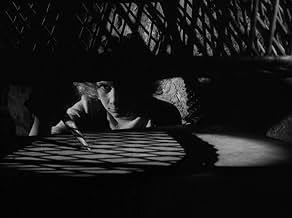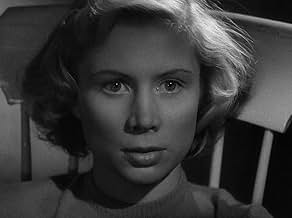VALUTAZIONE IMDb
6,7/10
2225
LA TUA VALUTAZIONE
Un regista cerca di creare il migliore film della storia, ma scopre che le capacità umane hanno i loro limiti.Un regista cerca di creare il migliore film della storia, ma scopre che le capacità umane hanno i loro limiti.Un regista cerca di creare il migliore film della storia, ma scopre che le capacità umane hanno i loro limiti.
- Regia
- Sceneggiatura
- Star
Birgit Lindkvist
- Anna
- (as Bibi Lindkvist)
John W. Björling
- Man in Birgitta's Dream
- (non citato nei titoli originali)
Sven Björling
- Filmworker at Film Studio
- (non citato nei titoli originali)
Anita Blom
- Anna
- (non citato nei titoli originali)
Britta Brunius
- Lasse's Mother
- (non citato nei titoli originali)
Åke Engfeldt
- Police Officer
- (non citato nei titoli originali)
Gösta Ericsson
- Police Officer
- (non citato nei titoli originali)
Kenne Fant
- Arne
- (non citato nei titoli originali)
Trama
Lo sapevi?
- QuizIngmar Bergman's first film based on his own original screenplay.
- Curiosità sui creditiThere are no opening titles in this film. An unseen narrator (Hasse Ekman) reads the credits, as well as the title, out loud approximately ten minutes in to the movie. The sole title card is the standard "Slut" (Swedish for "End") that closes the picture.
- ConnessioniEdited into Histoire(s) du cinéma: Une histoire seule (1989)
- Colonne sonoreDrömmen
Composed by Erland von Koch (1949)
Recensione in evidenza
"Prison" (1949) is the first film in which Ingmar Bergman develops something like a style of his own.
We see various elements that reappear in later movies. There is the character of death (to reappear in "The seventh seal", 1957) and dreamsequences (to reappear in "Wild strawberries", 1957).
The most important sign for things to come is however the theme of the film. The film is about a director trying to make a film about a world governed by the devil. Is a world governed by the devil not very much like a wordl where God is silent? Later Bergman would make a trilogy around this theme consisting of the films "Through a glass darkly" (1961), "Winterlight" (1963) and "The silence" (1963).
So in "Prison" Bergman started to experiment with a personal style, but this style was not fully developed yet. There are good sequences (such as the dream sequence) but as a whole the film is somewhat cluttered and inaccessible. Moreover the film in a film format about a director struggling to make a film does not work very well in "Prison". It does work very well in "8,5" (1963, Federico Fellini), but the Bergman of 1949 is not the Fellini of 1963.
We see various elements that reappear in later movies. There is the character of death (to reappear in "The seventh seal", 1957) and dreamsequences (to reappear in "Wild strawberries", 1957).
The most important sign for things to come is however the theme of the film. The film is about a director trying to make a film about a world governed by the devil. Is a world governed by the devil not very much like a wordl where God is silent? Later Bergman would make a trilogy around this theme consisting of the films "Through a glass darkly" (1961), "Winterlight" (1963) and "The silence" (1963).
So in "Prison" Bergman started to experiment with a personal style, but this style was not fully developed yet. There are good sequences (such as the dream sequence) but as a whole the film is somewhat cluttered and inaccessible. Moreover the film in a film format about a director struggling to make a film does not work very well in "Prison". It does work very well in "8,5" (1963, Federico Fellini), but the Bergman of 1949 is not the Fellini of 1963.
- frankde-jong
- 14 giu 2023
- Permalink
I più visti
Accedi per valutare e creare un elenco di titoli salvati per ottenere consigli personalizzati
- How long is Prison?Powered by Alexa
Dettagli
Botteghino
- Budget
- 240.000 SEK (previsto)
- Tempo di esecuzione1 ora 19 minuti
- Colore
- Mix di suoni
- Proporzioni
- 1.33 : 1
Contribuisci a questa pagina
Suggerisci una modifica o aggiungi i contenuti mancanti

































